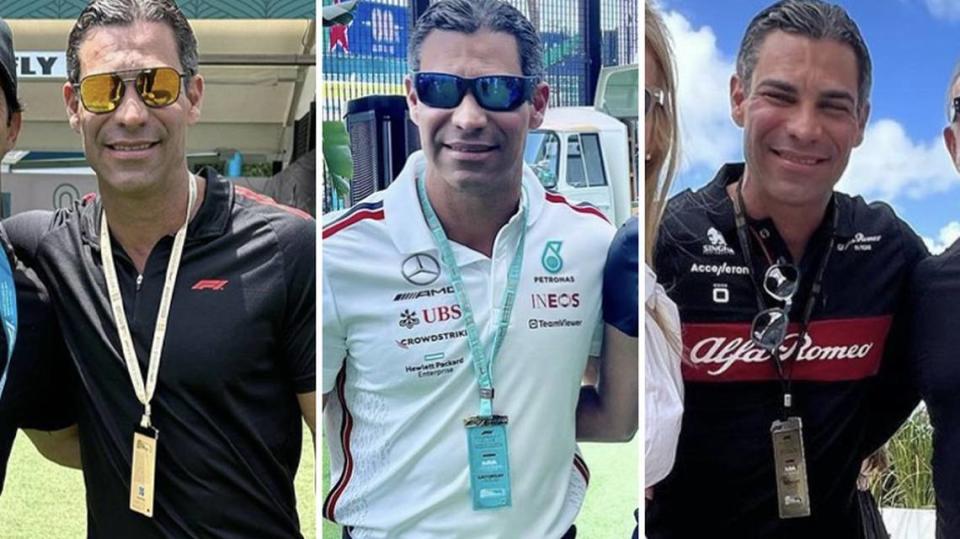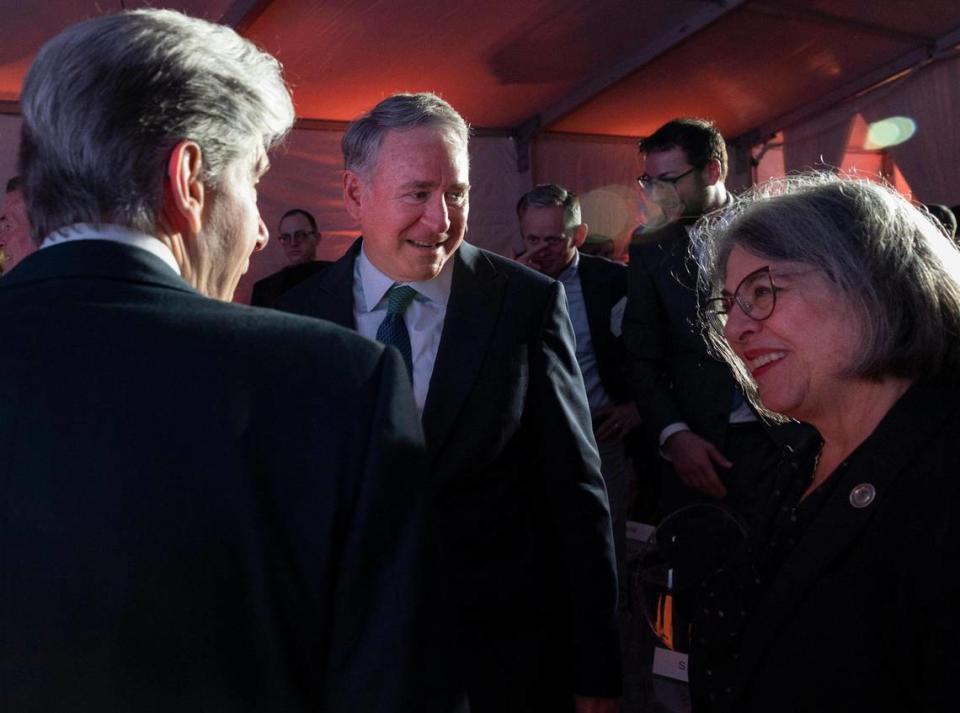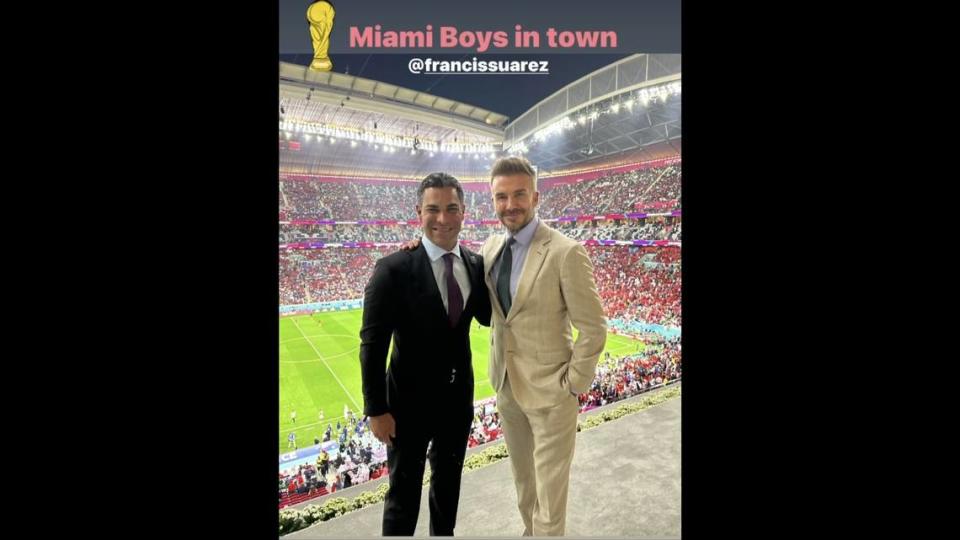Newly dismissed ethics complaint on mayor’s F1 weekend details repayment to billionaire
- Oops!Something went wrong.Please try again later.
The state Ethics Commission on Wednesday dismissed a complaint alleging that Miami Mayor Francis Suarez improperly received tickets to last year’s Formula 1 race in Miami from billionaire Ken Griffin, concluding the mayor repaid the cost of the VIP passes to the Sunday race for him and his wife.
But the investigation did not address other key questions raised in the complaint, namely who provided his other VIP passes throughout the three-day Grand Prix weekend from May 5-7.
Records released by the Ethics Commission show Suarez did not cut the $14,000 reimbursement check to Griffin until two months after the event — about a week after Miami Herald reporters first raised questions about the legality of Griffin inviting the mayor and his wife to the Grand Prix and a big-ticket after party.
Florida law prohibits the mayor or his wife from receiving gifts valued over $100 from anyone with business before the city. Griffin’s company, Citadel, has been lobbying the city as it moves its headquarters to Miami.
A copy of the voided check provided to the ethics commission shows Suarez repaid Griffin for the F1 tickets on July 5. The mayor cut the check 59 days after he attended the luxury event at Griffin’s invitation, well within the 90 day grace period for repayment allowed under Florida Law to avoid reprimand.
Suarez and Griffin have both previously refused to provide copies of the check when asked by the Herald.
The ethics investigation was based on a complaint filed last year following Herald reports detailing how the mayor watched the Grand Prix from F1’s most exclusive viewing suite. Social media posts show he attended all three days of races, and was accompanied by his wife, Gloria, on both Saturday and Sunday.
The report by ethics investigator Tracey Maleszewski largely focused on corroborating information previously reported by the Herald about the source of the couple’s Sunday passes, which were provided by Griffin and then reimbursed, and one Saturday pass, which the mayor previously disclosed was provided by the local F1 promoter.

It’s not clear why Maleszewski did not seek information on the sources of Suarez’s Friday pass or his wife’s Saturday pass to the F1 VIP viewing lounge, valued at thousands of dollars a piece. Instead, the investigation explored Suarez’s attendance at several after-parties, including the $3,000 per-plate Carbone Beach dinner-club, that were not explicitly mentioned in the complaint but were detailed in Herald articles attached as exhibits.
The Herald could not reach Maleszewski for comment Wednesday evening. Public Ethics Commission Executive Director Kerrie Stillman said she did not have time to respond by the Herald’s Wednesday deadline.
The mayor’s office touted the complaint’s dismissal as a victory in a series of posts made to social media, calling the ruling a “significant reprimand” of the Herald’s reporting.
“Today’s bipartisan and unanimous exoneration provides irrefutable proof that the vicious and politically motivated attacks on Mayor Suarez’s character are completely inaccurate and without merit,” the statement said.
Suarez did not respond to the Herald’s specific questions about whether he had always intended to pay Griffin back or if the repayment was prompted solely by the Herald’s questions. He declined to say who provided the remaining Friday and Saturday passes.

Zia Ahmed, a spokesperson for Griffin, also declined to answer specific questions, but said the decision proved Griffin acted appropriately.
“As we said from the beginning, there’s no there there. There never was,” Ahmed said.
Last year, Ahmed initially told the Herald that Griffin had invited Suarez to the F1 race weekend. After the Herald published the story, he clarified to say Griffin had only invited the Suarezes to the Sunday race and Saturday night after party.
THE PROBE
The case file became public Wednesday, after a closed-door hearing last week in which the commission found “no probable cause” following the recommendation from advocate Melody Hadley.
Hadley, who made the recommendation based on the investigator’s report, said Suarez had not received a gift under Florida law because he reimbursed Griffin for the Sunday tickets, which invoices indicate cost $8,000 together. Suarez also reimbursed Griffin for two dinner plates to the VIP dinner at Carbone Beach on Saturday evening totaling $6,000.
Suarez told investigators that he either repaid or disclosed all other gifted tickets. The complaint file provided to the Herald shows investigators did not seek proof beyond his testimony and his official disclosure, which lists a single Saturday ticket worth $3,500 provided by the race promoter.
The Ethics Commission justified its narrow investigation, saying the complaint lacked sufficient detail necessary to investigate broader questions about the mayor’s attendance at other luxury sporting events like the 2022 World Cup in Qatar.

Beyond that, the investigative report detailing Suarez’s F1 weekend contained several omissions and inaccuracies.
The investigative report incorrectly stated that a developer linked to the hospitality group that offered Suarez his Friday night invitation to Carbone Beach was not lobbying the city government at the time. In fact, city records show the developer had two lobbyists registered on behalf of its highrise waterfront project.
Suarez also told ethics investigators he attended the Friday night after-party in his official capacity as mayor, leading Hadley to determine the complementary access was not a violation of gifts law. But the mayor’s calendar, which is a public record, showed the whole day blocked off as personal time for Suarez. Moreover, the event was not held in Miami, but rather the neighboring municipality of Miami Beach.
The advocate’s recommendation to dismiss the complaint was also partially based on a statement in which Suarez said Griffin had offered him event tickets because Griffin is a client of the international law firm where Suarez works as a part-time attorney.
The complaint file did not include original transcripts or notes detailing the investigator’s conversation with Suarez. But the ethics investigator’s summary of Suarez’s testimony contradicts previous statements from both Griffin and Suarez’s law firm, Quinn Emanuel Urquhart and Sullivan, that Griffin has no relationship with Suarez through the law firm in order to comply with other ethics laws prohibiting conflicts of interest.
In a statement, a spokesperson for Quinn Emanuel said the firm stands by its previous statements to the Herald.
“Francis Suarez has never worked on any firm matter related to Ken Griffin or Citadel,” the spokesperson said. “Quinn Emanuel is unaware of any connection between the F1 tickets and his employment at the firm, nor did Mr. Suarez make such a connection in his interview with the Commission.”
Suarez did not respond to the Herald’s request for comment regarding his statement.
Thomas Kennedy, a Miami activist who filed the complaint in July, told the Herald that he thought the Ethics Commission hadn’t done enough to uncover whether Suarez had misused his position as mayor during the F1 weekend.
“It is a bit shocking how shoddy the work was and almost how shamelessly and carelessly they presented their work, especially considering not only what I included but all of the scandals surrounding the mayor,” said Kennedy in an interview on Wednesday. “How aren’t they embarrassed to present this to the public?”
Suarez’s attorney, Ben Kuehne, in a recording of the closed ethics hearing at the First District Court of Appeal in Tallahassee on March 8 called Kennedy a “serial complainant,” even though Kennedy has filed only two state ethics complaints.
On behalf of his client, Kuehne told the Herald that Suarez “calls on the public to advocate, as he does, for the good that accompanies his leadership. And resist the few who choose complaining as a way of life.”
Kennedy filed one other state ethics complaint which was previously dismissed. He also filed another complaint regarding Suarez’s attendance at VIP sporting events to the Miami-Dade county ethics commission, which dismissed the complaint without investigation on Sept. 15 because Kennedy didn’t have personal knowledge of what he was alleging.
The state ethics complaint moved forward because state law does not have the same standards. But that will soon change. The Florida Legislature just passed a bill that would create similar personal-knowledge requirements, indicating complaints like Kennedy’s might not be investigated at all in the future, at either the county or state level.

